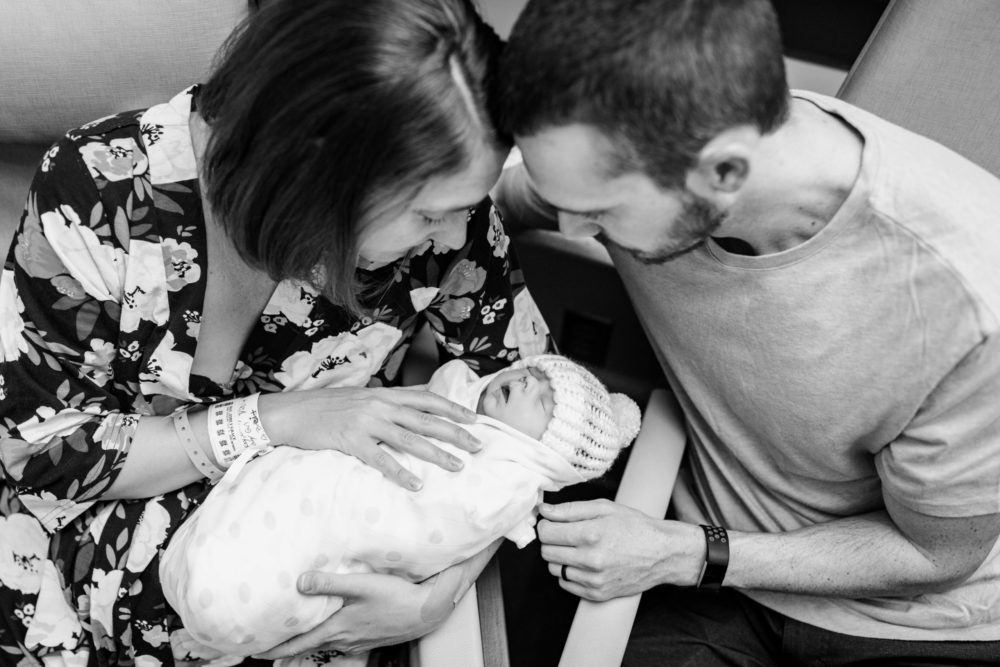The doctor put Adelyn Rose on my chest and said, “There’s your troublemaker.” High fluid, so many pounds, my body stretched to the max, concern about her coming early.
And then they took her away and never really gave her back until she was still and lifeless. I didn’t even have the courage to look at her until she lay in the transport device for the ambulance, waiting to go to the advanced NICU. It felt like my heart was being wrenched out of me.
A baby born at 35 weeks should eventually be fine, especially my baby. I’m strong; her father is strong. We’re healthy; our families are healthy. How could this be happening?
Again.
Yes, this was the second time I’d birthed a baby who was stolen from our family. The difference was that this time, it wasn’t expected. We had no idea. No one had any idea. I struggled in my hospital bed, alternating between praying earnestly and thinking, “Are you kidding me?”
My mind flashed back to less than two years ago when we did know—when I held another newborn, a precious baby who we expected to part with because her skull and, therefore, her brain had not formed properly. We mentally, emotionally, and spiritually prepared to love Lillian Faith, to hold her, let our family meet her, and then give her back to Jesus. Lillian’s heart beat for less than 45 minutes, but we held her for hours, sang over her, cried, took a thousand pictures, introduced her to her big sister…
I wasn’t even holding Adelyn. I remembered the encouraging words from so many of our family members over the past nine months, so many friends—people who don’t just “say stuff.” Prayer warriors, brothers and sisters in Christ who had walked with us through our last major loss, who understood the weight of their words. They were so sure it would be different this time. We all had a good feeling about it.
Then, in my mind, I began asking questions about the timing. We had an appointment with the high-risk doctor the next day for a second opinion on my high fluid. Would he have known? Would anyone have known?
The answer came to me — God knew. I reverted back to, “We trusted You. We let our anxiety and apprehension go this time because we believed in Your goodness.”
My husband was even more shell-shocked than I was. And angry — really, really angry. He probably broke a bone in his hand punching a hospital door. He ate nothing, and I felt helpless to comfort him.
Yet, the image that kept returning to me was standing before God with my arms held high. It started in the hospital bed where I first birthed Adelyn. I just sat there, begging God with my hands open, palms up, “Healthy baby, healthy baby, healthy baby. Please God, healthy baby,” as I tried to tune out what was happening in the room, where no less than 25 healthcare providers tried to save our baby’s life and care for me.
Then in my head, it morphed to standing, arms held high with my hands and fingers stretched as open as they would possibly go, before God the Father, submitting again — my will, my dreams, my family, my plans, my life. Emptying myself of anything earthly that might remain there.
I have been studying the Bible my entire life, memorized whole chapters, done countless Bible studies, but in that moment, there were no words. Literally no helpful Bible verses or churchy platitudes. I simply had nothing, was totally empty.
Jesus taught, “Blessed are those who mourn, for they will be comforted” (Matthew 5:4). In America, we don’t usually say “mourn.” For some reason, “grieve” seems weightier.
Grief is a place of total emptiness. It is a fire that burns but does not consume. And in my mind, comfort carries a much more pleasant connotation than it deserves. The grieving have very few pleasantries. They’re fortunate to get out of bed every day, to recognize some good during the healing process, to experience any semblance of joy. They’ve got nothing, so they don’t need a lot, simply to be sustained.
There was something relieving (possibly comforting?) about having nothing, resting in my human emotions, the humanity created in the same image of God that my babies were. We must stand for what we believe if we really believe it, even if sometimes that’s just standing before God empty, our mind void of thought, our mouths frozen, but our hearts stretched high in total surrender. The words of Jesus run deep when you’ve hidden them in your heart. Their living and active power sustain your soul, even when you can’t recall them.
In those moments of desperation and despair, somehow I felt God holding me, holding us. Where else would I go? Where else could I go? God didn’t want anything from me right then. Good thing, because I had zilch to give. He just wanted permission to stand with me in the fire.
“Blessed are those who grieve, for they will be sustained” (Matthew 5:4; Romans 8:28; John 6:68).





